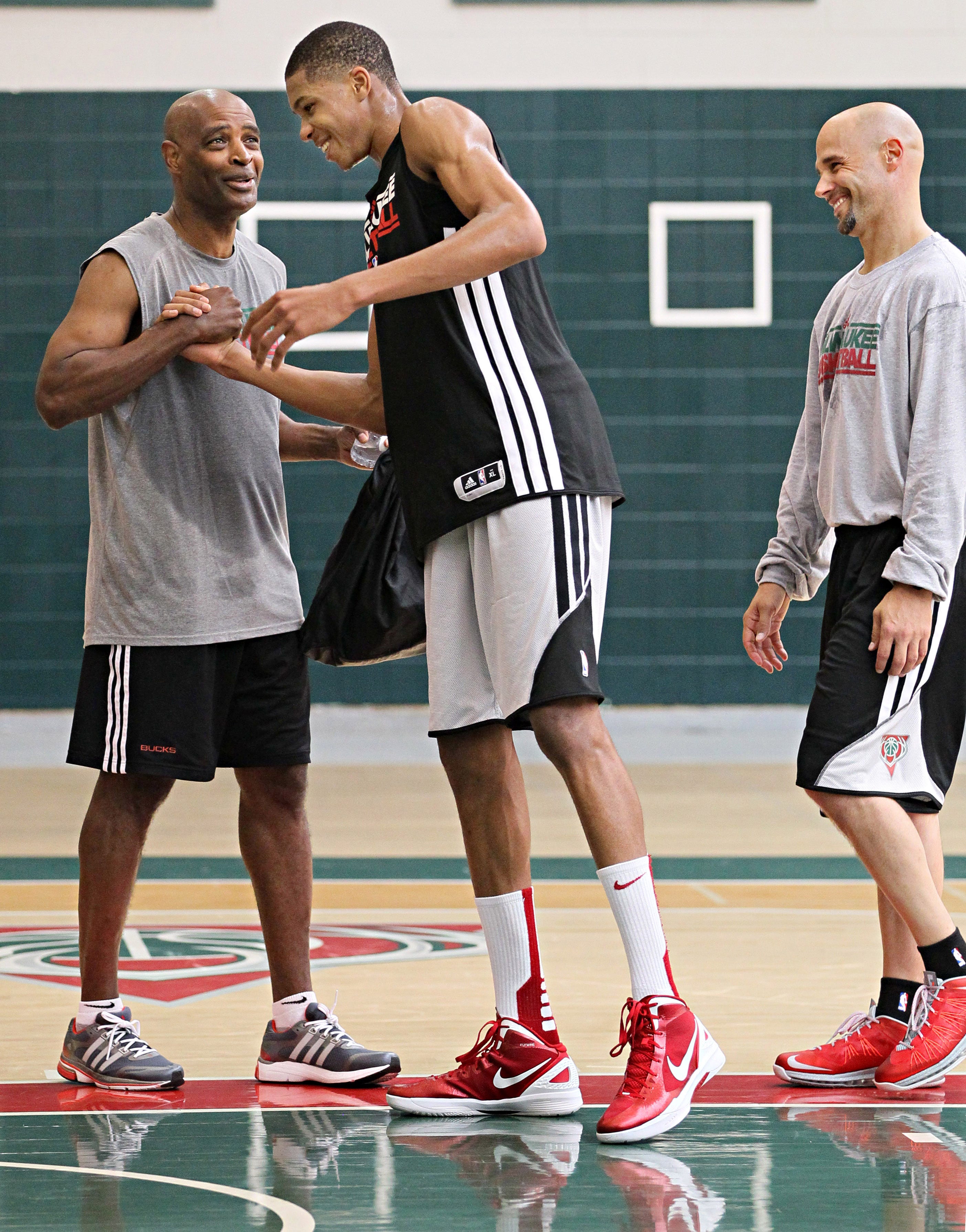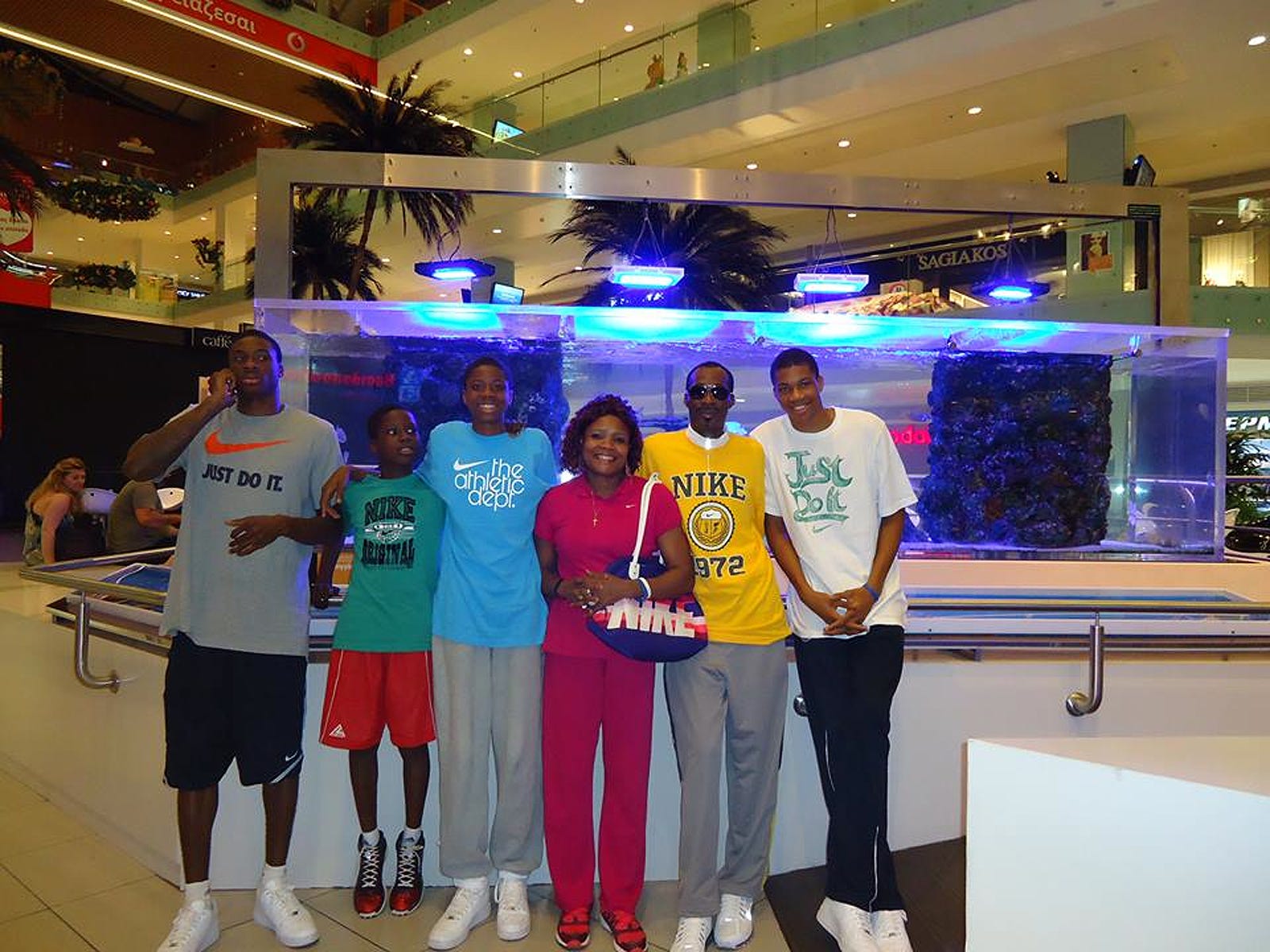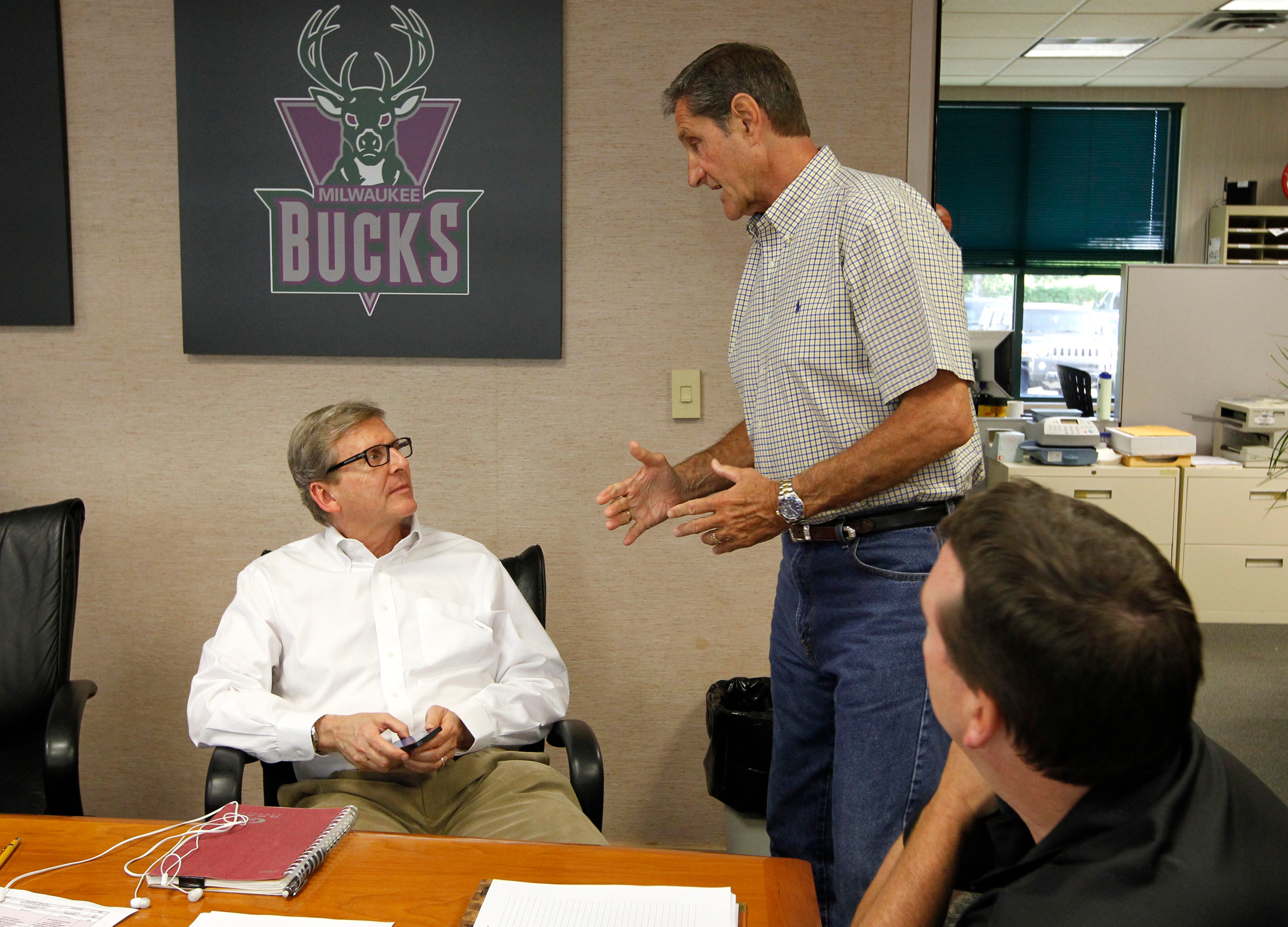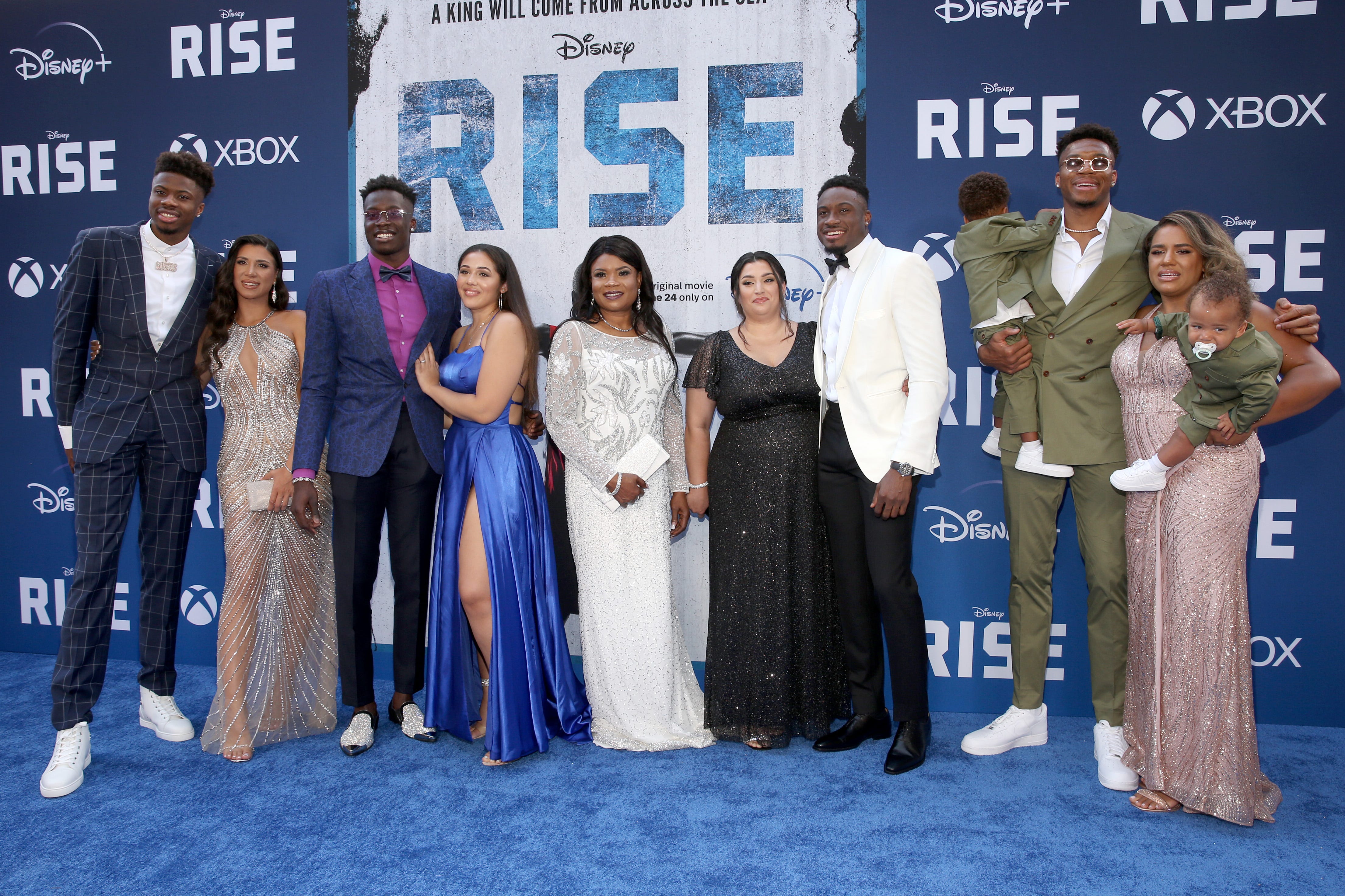There was always a cool draft in the outer halls of the Bradley Center, with air seeping through the loading dock doors that led out to the small players' parking lot. And on an 18-degree night on Feb. 3, 2014, it was more than chilled.
A teenage Giannis Antetokounmpo didn’t notice, gleefully introducing his family to anyone and everyone after their first Milwaukee Bucks game. He was most proud of his younger brothers, Kostas and Alex, reaching for them to pull close, proclaiming how much better than him they would be.
Just shy of a decade later Alex smiled widely as he walked down the carpeted, temperate hall outside of the Bucks locker room in Fiserv Forum. On a night off from his Wisconsin Herd, he tried, somewhat unsuccessfully, to wrangle his nephews. Giannis’ oldest scooted out of reach, much to his delight.
The throughline of Giannis Antetokounmpo’s 10-season NBA career has been family, but in a nine-month stretch in 2013, such moments felt unattainable.
When Antetokounmpo became the youngest player in the NBA at 18 years old out of Greece, the organization proved to be the right team, at the right time, to act as the incubator for one of the great modern examples of the American dream. Without the people behind the scenes, it’s possible the tale could never have been authored.
More: Alex Antetokounmpo is forging own path in basketball: 'I’m me and I’m OK with who I am'
More: 'It's bigger than basketball': Three Antetokounmpo brothers share NBA court for first time


Bucks created a family atmosphere for Giannis
As they approached the 2013 draft, the Bucks had zeroed in on Giannis Antetokounmpo with their No. 15 pick. He was their guy. Beyond the on-court comparisons he evoked, there was someone else in the back of general manager John Hammond’s mind as he thought about bringing the European teenager to the United States – Darko Miličić.
Ten years prior, Hammond was the vice president of basketball operations in Detroit when the Pistons drafted the 18-year-old out of Serbia with the No. 2 pick, just after LeBron James and over Carmelo Anthony, Chris Bosh and Dwyane Wade. Hindsight offered Hammond clarity: The Pistons didn’t do enough to make Miličić comfortable in his transition to America, to better set him up for success. Specifically, the teenager didn’t arrive with any familial support.
For Antetokounmpo to develop into the all-star the Bucks thought he could be, he would need more than just skill and physical development. Hammond knew it.
John really promoted more of a family-type atmosphere so that the coaches were involved with the players and communicating with them.
He also knew the Bucks were positioned to provide it. After taking over the general manager position in 2008, he fostered a player-first culture and rookies were especially considered. Needs and relationships varied by player, but the emphasis was the same: Apply a personal touch and help whenever, wherever needed. Assistant video coordinator Ross Geiger and his Subaru Outback have become legends due to his travels with Giannis, but Geiger spent just as much time driving 2012 second-round pick Doron Lamb.
“John really promoted more of a family-type atmosphere so that the coaches were involved with the players and communicating with them,” said former assistant general manager David Morway, who was hired in July 2013 after the departure of Jeff Weltman. “The front office was involved with the players and communication with them, talking with them, not so much on a basketball level – sometimes on that – but more on a personal level.”

If there was any thinking Antetokounmpo may not need that familial touch, he hammered the fact home. He told the Bucks two things he needed if they drafted him: He had to play in the NBA immediately and his parents, Charles and Veronica, and brothers must join him in Milwaukee.
“I was a kid,” Antetokounmpo said. “They throw you in this NBA life with pros and vets and the coaches, but like, I was a kid. I had never left home. Like, I never left home.”
The Bucks knew the Antetokounmpos were living illegally in Greece, but Giannis’ visa situation cleared up before the draft when the nation granted him citizenship. It not only made Antetokounmpo eligible to play for Greece’s national teams but allowed him to secure a P1-A visa to work in the United States.
As for the family, the organization strongly felt its resources, along with the help of the law firm Quarles and Brady, Giannis’ agency and NBA lawyers could get them to the United States.
Antetokounmpo initially came to Milwaukee for post-draft festivities and then spent the summer with the Greek national team before returning for training camp. Sunken into a chair in a small lounge off the visitors' locker room in Charlotte this past December, Antetokounmpo looked off into the distance as a memory rushed back.
“I remember when my dad came onto the balcony and I said, ‘Dad, I’m leaving,’ and he said, ‘Be careful, take care of yourself,’” he began, a smile spreading across his face, a glint in the corners of his eyes. “I said, ‘Dad, I’ll be back, I’m coming back for you guys. I’m bringing you back to the States.’”
Until then, the Bucks would apply the off-court values Hammond fostered. As the weeks and months wore on, it was discovered such personal touches meant more for Antetokounmpo than for most.

“Remember, this guy had to learn the language, he had to learn what’s a smoothie, what’s a McDonald's,” former television color analyst Jon McGlocklin said. “He wasn’t just learning basketball – he had to learn life!”
In learning life in the United States, there were plenty of fun discoveries Antetokounmpo explored in his new world. There were also nights he slept at the Cousins Center. He had a three-bedroom apartment at The Landing at Park Shore with the expectation his family would be joining him, only to return to it alone.
“The way I am, I’m very locked into myself and to what I had to do to be great, I had no friends,” he said. “I had zero friends.”
His solitude was concerning, so much so that his one family member in the country, older brother Thanasis, would fly to Milwaukee at every moment – once for as few as six hours – to be there for Giannis. But even then, Thanasis knew Milwaukee was clearly the right place for Giannis.
“John Hammond – you understand – he made us feel really at home,” Thanasis said.
Hammond was able to create that feeling in part because in 2013-14, the Bucks had six people listed in the media guide on its executive staff – including Herb Kohl as team president. On the basketball operations side, there were six coaches and 15 in the scouting, personnel, security, physical therapy and strength training fields.
Current Bucks general manager Jon Horst, the director of basketball operations at the time, said such a tight-knit staff fostered camaraderie among each other and the players. It had a feel of a “mom and pop shop” with people who were instrumental in keeping Antetokounmpo as happy as he could be.
Coaches would stop him from his hours-long individual work to ask if he was OK. No, really. Are you OK? To Antetokounmpo, Hammond was a father figure, and his door was always open. O.J. Mayo gave Antetokounmpo living and dining room furniture and then helped move it in. The Morways hosted Antetokounmpo for dinners. Play-by-play voice Jim Paschke helped him with his English. Geiger and Horst taught him how to drive. The team gifted him a custom pool kit, with monogrammed balls and a stick. Larry Sanders gave him shoes, and Ersan İlyasova passed down jeans.
They could see the loneliness wearing on Antetokounmpo, though.
...But I don’t play the game of basketball just to be here, to hang out and play — I did it because I wanted to eat.
Geiger lived in the same building and the pair had become nearly inseparable, and he saw quickly “how much he was struggling, missing his family, devastated that they couldn’t enjoy this special moment of him making the NBA and what the NBA is all about, what America is all about," he said.
“It just really started to take its toll as time continued on.”
On the court, Antetokounmpo’s role grew. He didn’t play in five of the first 15 games – and averaged 14 minutes when he did play – but that changed on Nov. 30, 2013. He played 27 minutes that night against Boston, and from there he started 21 of the next 32 games before his family arrived.
He shot the ball only six times and averaged 7.8 points per game, but everyone could see the outline of a special talent in his movement, court vision and a work ethic that reminded coaches of all-time greats.
Often, however, his mind was elsewhere.
“I was homesick,” Antetokounmpo said. “I quit – not quit – I almost gave up a lot of times. Not give up the game of basketball – I played the game of basketball because of my family.
“That’s why I played the game of basketball, so I could provide a better life and better opportunity for me. But I don’t play the game of basketball just to be here, to hang out and play – I did it because I wanted to eat.”
On the court, the Bucks were plummeting to a franchise-worst 15-win season. Behind the scenes, Kohl’s stewardship of the franchise was quietly coming to an end. After 24 years in the U.S. Senate, a widely respected tenure that spanned four presidents, he had retired in January 2013.
On the last day of the regular season – April 16, 2014 – Kohl announced a deal to sell the team after 29 years.
For Antetokounmpo, the final nine months of Kohl’s ownership would be life-changing.
Kohl’s full-time job was governing the Bucks, but he still had powerful connections in the highest reaches of Democratic President Barack Obama’s administration.
For months, the Antetokounmpos were being denied visas under Section 214(b) from the Bureau of Consular Affairs. Per the U.S. Embassy website, “an intending immigrant must show that their economic, family, and social ties outside the United States are strong enough that they will depart at the end of their authorized stay and that their intended activities in the United States will be consistent with the visa status.”
With no citizenship in Greece or strong ties to Nigeria, it was impossible for the Antetokounmpos to meet that standard.
There was no limit to the number of times they could apply, but they would have kept receiving the same denial because their circumstances weren’t going to change.
“That visa process can be fairly opaque,” said David Wade, Secretary of State John Kerry’s chief of staff at the time. “The best part of the system is that it applies to everyone – but the worst part of the system is that sometimes you can get an answer many times and not understand why you’re getting that answer. Because it is, by definition, a complicated system.
“There are legitimate reasons for that (denial). But I think if you are the person just getting that letter with the rejection, you’re naturally bewildered and you don’t have the contacts (to explain it).”
Some part of the application process was broken, but there was no clarity on what.
At the Cousins Center, Antetokounmpo was regularly in Hammond’s and Morway’s offices looking for hope, a shred of progress.
“‘Mr. John! Mr. Dave! When are they coming?’” Antetokounmpo remembered asking, his pitch raising in an effort to impersonate his teenage timbre. “’They’re coming soon.’ ‘But you told me that last week. When are they coming?’ ‘They’re coming soon. We’re figuring out something with their visas to apply and the embassies and blah blah blah and this and this.’ ‘I don’t understand – tell me when they are coming! Give me a date. Monday? Friday? Give me a date!’”
It was something the organization couldn’t do.
“There were a lot of days that I thought ‘I don’t know. I don’t know if we’re going to be able to get this done,’” Morway acknowledged. “It was scary. I was scared for Giannis. Forget the franchise. Franchise is secondary when it comes to these kinds of personal issues.”

Herb Kohl reluctantly used his Washington connections to help bring Giannis' family to the United States
The months stretched on until Sept. 5, 2013, when Bucks leaned more heavily on the skill set of Kohl’s longtime right hand, JoAnne Anton. Kohl sponsored or cosponsored 44 pieces of immigration legislation in his senatorial career, and Anton was his state director for the final 19 years of his tenure. In 2013, she was his assistant with the Bucks and her deep knowledge of immigration policies and connections in Washington, D.C., were a vital addition to the effort to find the right path for the family.
No one – from the Bucks organization to State Department staffers – wanted this to ascend any higher in their respective organizations. Kohl had never wielded political influence in matters of basketball and the State Department did not want to involve its highest-ranking officials.
But despite all the knowledge of those involved, the doors to an accepted visa application remained shut.
It was time.
Kohl had to pick up the phone.
In October 2013, he called the Secretary of State, his former senatorial colleague and friend, John Kerry.
“I was struck by how reluctant Sen. Kohl was to come to us,” said Wade, who was on the call also. “He did not want to call on a friendship. He didn’t want to have any kind of special treatment. He wanted to go through the process the ordinary way.
“And ultimately the way that this succeeded was through the ordinary channels, but it was helpful for Secretary Kerry to be able to explain to them why they weren’t having better results and to help them think about how to adjust to that.”
Kerry could not be personally involved with consular affairs for ethical reasons and did not make any promises, a State Department official who was involved in the process told the Journal Sentinel, but he was in the staff meeting.
Kerry’s knowledge of immigration policy and bureaucracy and ability to translate it armed Anton and the Bucks with a deeper understanding of the application process, and they started at it again.
The work – the care – paid off. On Jan. 28, 2014, the Antetokounmpos were informed Charles was given a P-1S visa as support personnel to Giannis. Charles qualified as a provider of emotional and mental support, as well as developing his son’s skills in his sport of choice. Veronica, Kostas and Alex could come to the U.S. under Charles’ visa.
Even now, Giannis’ smile is unbridled.
“Their life changed, you know?” he said.
In a statement to the Journal Sentinel, Kohl wrote: “When Giannis arrived, we as an organization needed and wanted to help him be successful. His family was such a big part of his drive and focus, especially his father who was legitimately, his training coach. It was a fairly unique, and we hoped compelling, situation. That is the case we were ultimately able to make (to the State Department) in order to bring his parents, Charles and Veronica, along with brothers Kosta and Alex to what would become their new home, Milwaukee.”
It was the only time anyone could recall of Kohl using his connections in government to assist an athlete on the Bucks.
But no one who knew Kohl was surprised that if he were ever going to do it, it wouldn’t be for basketball.

Giannis had an 'MVP human being' in Herb Kohl on his side, former Secretary of State John Kerry says
“I was struck by how much Herb approached Giannis’ situation in a way that says a lot about who Herb is to his core,” Kerry said to the Journal Sentinel in a statement. “Inside the Senate, he was always known for being especially thoughtful and considerate of his colleagues as human beings, and for being unbelievably focused on ethics in the best of ways. He cared about doing everything by the book.
"When he reached out about this, it was both of those things. He didn’t talk about Giannis as a budding star or an investment for the Bucks, he spoke so sincerely about helping this young kid succeed with a family support system and Herb talked about him as a human being as if he was already a member of the Kohl family. He was talking as human being, not an owner or a senator.
“And then, because Herb is Herb, he couldn’t underscore enough that he wanted to make sure no one was doing anything except 100% by the books. He was integrity personified. He was motivated to do the right thing for this young person who had never left his country, and who wanted to have his parents by his side during his rookie season, but more importantly during a huge upheaval in his life. Herb cared about the well-being of his player during a tough life transition even more. Giannis had an MVP human being on his side from the owners' box.”
The Antetokounmpos' arrival in Milwaukee on Feb. 2 is recalled with crystal clarity for those who had worked for months to reunite them, from Giannis’ limo ride to Chicago to pick them up, their first trip to Walmart and dinner at Applebee’s, to their first meeting together with the front office in the conference room at the Cousins Center.
“From the moment they were reunited, one thing was clear – this was a very special athlete and family,” Kohl added in his statement. “Ten years later, we all have seen just how special, and are so glad he – and his family – still call Milwaukee home.”


Giannis' parents and brothers instantly knew Milwaukee was the right place
Horst mentally went around the table in the conference room that night, down to the seat of each family member.
“When his family arrived in Wisconsin, in Milwaukee, to come to our practice facility, to go to a game, is still one of my greatest memories, moments in personal and professional life,” he said, unable to stifle a smile. “It will always be. It was a massive deal.”
Morway’s voice cracked in recalling his first dinner with the family.
“I realized, oh my gosh, look what we were able to do and look how important it was,” he said. “It was really emotional.”
Then on Feb. 3, 2014, Charles, Veronica, Kostas and Alex attended their first game – seated directly in front of Kohl. Kostas said it still feels dreamlike and Alex added that it still blows his mind when he thinks about it. The youngest of the family’s smile mirrors that of his older brothers.
“Yeah, the perfect place,” Alex said of Milwaukee. “The perfect place.”
Would other NBA organizations have tried this hard to make things right for a player? Horst and Morway feel they would.
Ten years later, we all have seen just how special, and are so glad he – and his family – still call Milwaukee home.
Could another NBA owner have the manner and influence to help the team find its way through such a complicated governmental process? To those who were a part of it, in the government and with the team, that seems unlikely.
The consensus is the Bucks were uniquely positioned to bring the family over because of Kohl and Anton.
“It was beyond obvious, both from the senator and from JoAnne, that they wanted to help this person and this family out,” Horst said. “They had an ability and a willingness to do it that I believe was second to none. And in my heart of hearts, I believe that the city of Milwaukee, the Milwaukee Bucks and ultimately Sen. Kohl’s team, they were the right group to help Giannis and his family start the foundation for the successful journey that he’s been on.
"I don’t think we would’ve been where we are today if he and JoAnne wouldn’t have had that willingness and ability to help. His agents, Alex (Saratsis), Giorgos (Dimitropoulos) and Giorgos (Panou), deserve a ton of credit in that process as well and then our organization, our team, state department.”

Giannis has kept his joy
One afternoon following a practice in the Cousins Center in his first few months with the team, Antetokounmpo came bounding down the stairs from the film room with a backpack stuffed full of … who knows what. He was known to grab bottles of water, shoes, snacks, really anything he could, to bring home. But it was how he exited past veteran Caron Butler that caught the eye.
Antetokounmpo was skipping.
Butler watched him hop out and smiled. He said time, experiences, money – life – would erode such innocence. It always does. What he hoped for the teenager was that such unabashed joy would never diminish.
In that moment, however, it wasn’t clear it wouldn’t. Antetokounmpo was skipping out alone, to an empty place.
I cannot believe it. I’m a champion.
Seven seasons later, Antetokounmpo bent his knees and leaned against the wall outside the visitors' locker room in Fiserv Forum late on Oct. 19, 2021. The smile rivaled the one he had that chilly February evening in 2014. He slipped on his championship ring. “I cannot believe it. I’m a champion.”
Softly, he repeated it to himself.
“I cannot believe it. I cannot believe it.”
Thanasis stood next to him, holding the jewelry boxes and bags, grinning.
Giannis snapped to attention.
“Do you want to hold it!?” he handed his ring to a longtime observer, popping off the wall and sliding the ring off his finger. He unlocked it, showing how it could turn into a pendant, proud of the detail etched within. A team staffer walked through a set of double doors and he handed it to him, asking, “Do you want it?” Once the staffer took it, Giannis jokingly walked away with a bounce in his long strides.
Thanasis laughed. Giannis spun around after a few steps, and the rings were returned to the fingers of their rightful owners, who made fists, gently clicking the rings together. A second Bucks staffer suggested the brothers make their way down the corridor. The family was waiting.
One more time for emphasis, Giannis grinned.
“I cannot believe it.”